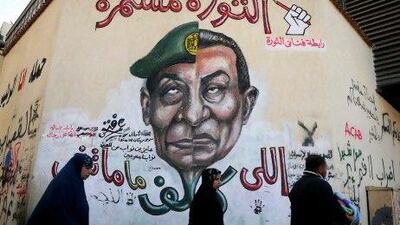CAIRO // With each week bringing a new political crisis, it is no surprise Egyptians think their country is being hijacked by a sinister conspiracy - although they can't agree on which one.
Some blame the instability on the conservative generals overseeing the transition to democracy after taking control when Hosni Mubarak resigned last year. Others fear an Islamist cabal, led by the Muslim Brotherhood, trying to fill the power vacuum, take over the government and establish a more religious state.
But a closer look reveals something more difficult to untangle: a country unsure of itself in the absence of the powerful executive that controlled nearly all politics for 60 years.
The regimes of Gamal Abdel Nasser, Anwar Sadat and finally Hosni Mubarak were characterised by different ideologies and historic challenges, but they all relied on a system in which power was highly centralised with the president.
The Supreme Council of the Armed Forces (Scaf) tried to take up that mantle after the huge street uprising that forced Mubarak to resign, but has struggled amid a revived political consciousness across the country, across regions and across religions. No matter their political orientation, Egyptians were no longer content with the old system of following a supreme leader.
What has emerged is a country ruled by islands of power, each following its own agenda.
This has created a debilitating transitional weakness: security has declined, the economy is in tatters and the country often appears on the verge of a nervous breakdown with frequent street protests and scandals.
"Egypt's institutions haven't collapsed, whether it's the judiciary, the military, the press, universities or parliament, but they are not working in tandem any more," said Khaled Fahmy, a history professor at the American University of Cairo. "There is no one centre in the country that can force its will and achieve some kind of harmony between these different groups."
Egypt has experienced the rapid twists and turns of a soap opera over recent months.
In December, the judiciary pursued an investigation into the work of foreign non-government organisations, despite the probe threatening Egypt's relationship with the United States, a major ally and a generous source of funding for the military.
A football match in February broke into a violent melee between supporters of rival teams, with 74 deaths.
And this week, in one fell swoop, the Supreme Presidential Election Commission disqualified 10 of 23 presidential candidates, a move that could completely redraw the political landscape five weeks before elections if appeals are unsuccessful.
Three of the front-runners who were disqualified have appealed - Khairat Al Shater, the former deputy leader of the Muslim Brotherhood, Omar Suleiman, the former vice president and intelligence chief under Mubarak, and Hazem Abu Ismail, the Salafist lawyer.
The calls this week from Field Marshal Hussein Tantawi, the head of Scaf, to finish the constitution before holding presidential elections could throw another spanner into the works.
The committee appointed by parliament to rewrite the constitution has been suspended by a court while a judicial panel examines the legality of the selection process. That could push back the transition several more months.
The consequences of Egypt's marred transition may provide a valuable lesson for other countries going through change after their own uprisings.
One of these is that without a clear road map to democracy, instability will sow havoc in any postrevolutionary country.
Even Tunisia, which chose to rewrite its constitution first, is facing its own problems with allegations of corruption and criticism of an opaque transition process. Libya appears even further away from a return to normal life, with armed militias still holding sway and a weak interim governmen with no real control over the country.
Mazen Hassan, a professor at Cairo University studying Egypt's transition, said it now appears "there is no master plan, no sealed deal behind locked doors" in Egypt.
"The developments are inconsistent and sometimes contradictory, unlike with a secret plan, which would show consistent developments towards a certain end," he said.
"We may just have to wait for it all to settle, but it won't be a clean process."
Follow
The National
on
& Bradley Hope on

